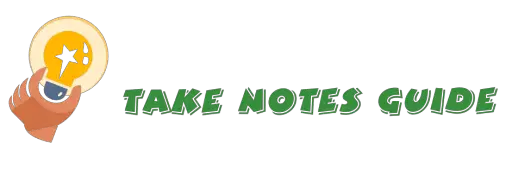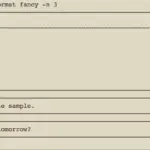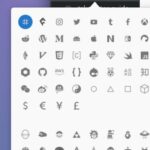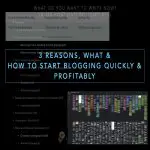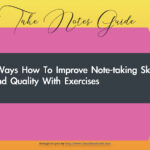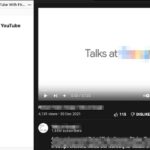This is my thoughts or research on traditional note taking systems. Some studies were done by others to evaluate how effective the systems are. These may help you to determine which may be better for you. However, individuals are different and one method may work for him but not for another. Whether you can connect with a method is also a key. You may start with any method from TakeNotesGuide.com you feel comfortable.
5 Evaluated Note-Taking Systems
- Mind Map – May benefit some subjects and students
- Cornell Notes – Mixed or inconclusive for result improvement
- SQ3R – Tedious process but effective from studies
- Guided Notes – Too dependent
- Sentence Method – Summarising without engagement
Recommendation: Focus with mental engagement and understanding before condensed note-taking. Or what works for you.
Below are my elaborated thoughts and explanations on each of the five systems. Please also read on to know more about my recommendation…
Mind Map
Regarding its effectiveness, a study (Cunningham 2005) indicated most students agreed it helped them. Another investigation by (B. Holland, L. Holland & Davies 2004) noted more benefits for arts than computer students. In addition, a study (Nesbit & Adescope 2006) also mentioned inconsistencies and those students of lower abilities may have more to benefit from.
Learning mind mapping does not guarantee it will help you definitely. Personally, I’m not quite fond of the tentacles-like or spider-web morbid, cluttered feel to it, but everyone is different. And it makes note sense to use mind maps for certain information or implementation than some others, that is clear to me. For example, hierarchical information that you need to memorize for passing the exams can be more useful with mind mapping than coding projects that you need to come out with a good business idea that can monetize, code, run and troubleshoot.
Moreover, I would recommend considering mind palace over mind mapping. Both have similarities in the placement of ideas – mind mapping is on paper location but mind palace on wherever mental location that you created to place (you still can note on paper where you place that idea or object in the mental world). Mind palace has more mental engagement and a better chance of associations and meaningfulness for memory and understanding.
On the other hand, if you prefer mind mapping anyway, then feel free to get ’stuck’ right here 🙂 Just go with what works best for you. Consider Markdown MindMap (Atom) or Coggle – Collaborative Mind Maps then.
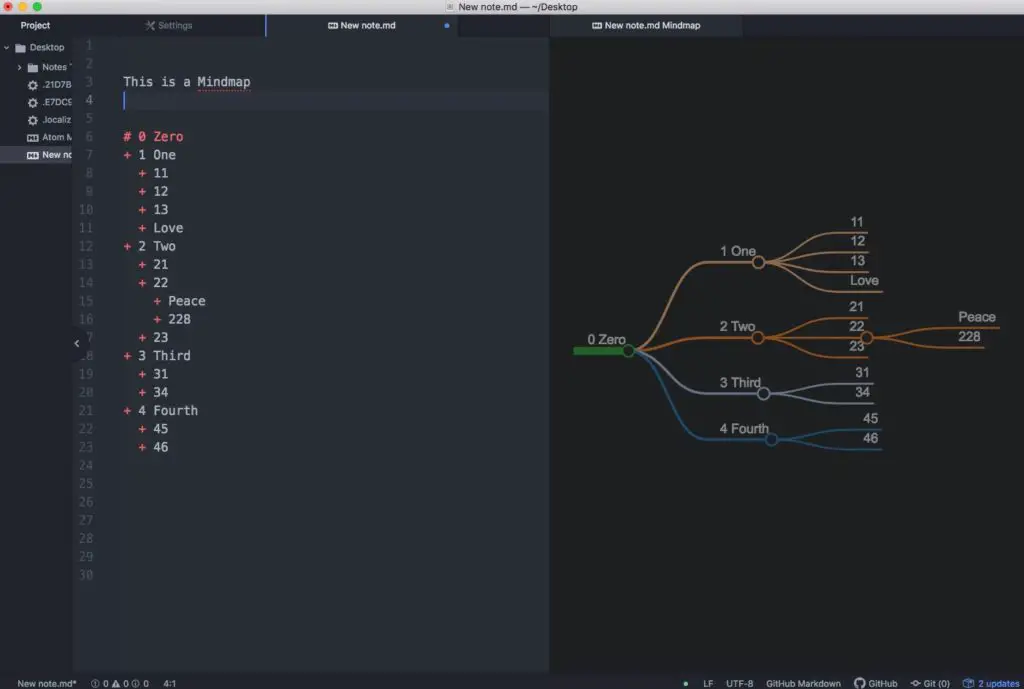
I also evaluated Markdown MindMap with Atom from How To Use Atom To Take Notes.
Cornell Notes
Studies done on Cornell Notes have conflicting results. A study (Quintus, Borr, Duffield, Napoleon, and Welch 2012) actually concluded no difference in students’ performance with Cornell notes or their own note-taking choice. A project (Broe 2013 p.31) also pointed out students take better notes but did not have better results. While some other studies noted benefits for students. I felt the mixed results or reviews published are not overwhelmingly optimistic overall.
Veterans may recommend Cornell Notes. Some teachers or educators teach this method of note-taking. However, I don’t quite care much for rigid, dividing lines on an uninspiring page nor the sample questions like “Why is this material significant?” (I would prefer other more relevant or interesting questions). Personally, I’d skip this but to each his own though.
SQ3R
SQ3R is an old method introduced since the 1940s. A study (Carlston 2011) indicated students remember more and thus better exam results. However, did you notice the number of times the material has to be gone through? I think if you studied material that number of times you should be more or less more well-versed in it. Kind of like rote learning which actually worked for me when I was just a kid learning English compositions. But rote learning is a simpler method. Rote learning alone evidently is not suitable or efficient enough for teens and adults having to process much more information. I believe SQ3R studies affirm the positiveness of its efficacies, just not for my style.
Guided Notes
Guided notes are handouts of lecturers. Together with other studies of similar results, an investigation (Hamilton, Seibert & Gardner III 2000) showed that guided notes did help improve student results. However, I think it is too dependent on others. Cultivating a habit of relying on handouts, even when guided notes handed out after note-taking to simulate understanding and engagement may result in better results, but may not be best in the long run. What happens when the student moves on to other classes, schools, and adulthood, will he still have the mentality of waiting to be spoon-fed answers?
In fact, millennial programmers are expected to be independent seekers for answers. They cannot afford to be restlessly on the constant lookout for handouts to everything. Instead, a solution would be to settle on a more sustainable method that can be commonly applied to every subject and beyond in this case.
Students can use guided notes when available or even better make your own guided notes or continue an effective note-taking strategy that works best for you.
Sentence method
There is no study of the sentence method‘s effectiveness mentioned. This is essentially what notes taking is these days – taking notes of summary but this method spells one sentence for every new thought, fact or topic in a separate line. Which begs the questions: Is every new thing important? How do you know which matters or doesn’t? What if he doesn’t understand the topic? I would say summary is the right way to take notes but students need to ask questions and/or train to think logically.
Recommendation
Focus on mental engagement and understanding to train a logical thinking mindset above all else, note-taking is just a secondary tool to help along the way. Give all your attention and train yourself to listen intently to understand the speaker instead of furiously writing or typing away. The key is to understand correctly first, to clarify all your points and doubts if you can before you move on. Any objective exam on a subject will test the correct understanding and knowledge (memory) of the student over anything else.
Make mental notes of important points (also a memory training) before you take short bullets notes down in your own words when there is spare time or end of the lecture. When and how to take notes in class or meeting? Please read that section in 10 ideas when to take notes.
Also, we need to consider some subjects that require a lot of practicing, repeating exercises or drills and doing homework. The more practice you do the better. Your notes may even become flash cards instead for spaced repetition purposes, in some cases or subjects web services such as Memrise (free and paid) can be helpful. Alternatively, Harvest.li just uses free spaced-repetitions email reminders to inform you when to review.
However, please use whatever works well for you. What you should use also depends on your personal preference on the way you take notes. For example, I use a note app to type first like this blog you are reading now. To me, modern note-taking is a very different landscape from traditional ones. You may wonder the effectiveness then please read Is It Better To Write Or Type Notes.
In addition, importantly support a good cause and wholesomeness. Take notes about what you believe in to be effective. That way you are writing along with the flow of your natural disposition instead of fighting against it upstream. For example, you are taking notes about the effects of climate change or veganism and how to make a positive impact to help the world and save lives, then you are writing in good conscience knowing you are moving in the right direction for world peace, while those who hold contrary beliefs and spread negative ideas will have a hard time convincing both themselves and others. Just like feeling the message and emotions a painting convey, people can tell how they feel about the quality of the writing and ideas just by reading. The correct belief system is paramount to taking effective and moral notes in my humble opinion!
Good luck to choosing whatever that you can connect with.
Related Questions
How effective was your note-taking method for you?
This is not easy to answer for everyone from a common stand. Though I have a weird angle that may help you answer this yourself. After you have taken notes for some time and having consumed considerable mental power when you took notes with much vigor and thinking of the subject matter, it would make sense for you to feel famished and somewhat exhausted. Effective note-taking should complement intense reflection and effort in understanding. This may differ and vary with individuals. Are you often hungry and tired after classes?
Templates for note-taking
Some may not like Cornell notes appearance but they would like to follow a certain guideline or format. Evernote, a modern note-taking app, has numerous templates to choose from and use right away.
Interesting and fun note-taking activities for class?
Please refer for some ideas in Top 9 fun activities for note-taking.
How effective is Memrise?
Please read here about Memrise’s science, fun and community.
